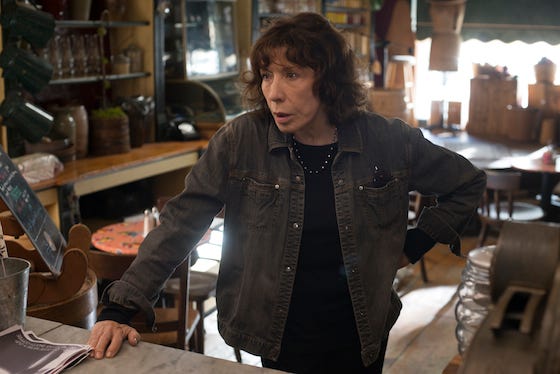Grandma

Lily Tomlin is rambunctious, pugnacious, cynical, aggressive, profane, vulnerable and lovable in screenwriter-director Paul Weitz’s “Grandma.”
The film takes place over a few hours as Tomlin’s Elle, a noted feminist poet, attempts to raise $600 so her pregnant teenage granddaughter, Sage, can get an abortion.
That plotline is just the deus ex machina to propel the storyline so we can learn about Elle, as she and Sage spend the day visiting friends in an attempt to raise the money. Along the way, we get to know Elle and see into her past.
Elle is going through a rough patch. She has just broken up with her much-younger girlfriend of four months. She also is still mourning the death of her longtime partner, Violet. Elle’s brittle and sardonic exterior masks a vulnerable and sensitive interior that quickly turns to anger when she encounters the unfairness of life and those she perceives as assholes. This includes Sage’s mother, Judy, a bossy and controlling executive whom daughter and grandmother must finally consult about the situation.
“Grandma” is a story about family dynamics. Elle became pregnant with Judy after a fling with a man she has never seen again. But Elle rationalizes that she did it because she wanted a child.
She introduces Sage to Karl (Sam Elliott), whom she later admits was once the husband she abandoned. Wounds are revealed when Elle reluctantly turns to Karl for the money.
Elliott’s role is short, but in his few minutes of screen time, he gives a profound and impactful performance as a man — though married five times and with 11 grandchildren — still deals with the agony and betrayal of Elle’s actions.
Karl agrees to lend Elle the money, but rescinds the gesture after discovering what it will be used for. The hurt in his voice as he berates Elle — not for helping Sage — but for leaving a hole in his life is heartbreaking.
Julia Garner gives a personable turn as Sage; she is a typical teenager — confused, snotty, disrespectful, afraid and with a false sense of defiant bravado.
Marcia Gay Harden as Judy adds depth and understanding to what could have been a stereotypical role.
But “Grandma” belongs to Tomlin. She gets under the skin of Elle, creating a complex woman who has lived life on her own terms and is accepting the price she paid. The role could earn Tomlin an Academy Award nomination.
At about 80 minutes, writer-director Weitz does not waste a frame of film. The movie is continually on the move as Elle and Sage battle the clock to get the teen to her clinic appointment while traveling from person to person to raise the needed cash.
Weitz’s dialogue is cutting and quick, and allows access to not only what characters are saying, but the silent meanings behind some of their words.
“Grandma” may be a small movie, but it makes big statements about trust, loyalty, love and — most importantly — family. It does so with emotion and humor — some of it acerbic, but most of it heartfelt.
Bloom is a member of the Indiana Film Journalists Association. His reviews appear at ReelBob (reelbob.com) and The Film Yap (filmyap.com). He also reviews Blu-rays and DVDs. He can be reached by email at bobbloomjc@gmail.com or on Twitter @ReelBobBloom. Other reviews by Bloom can be found at Rottentomatoes: www.rottentomatoes.com.

